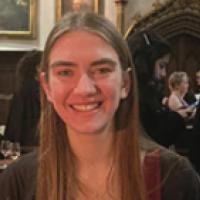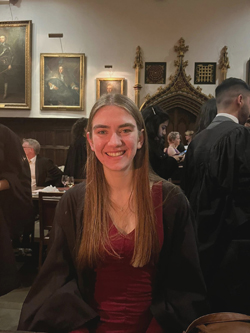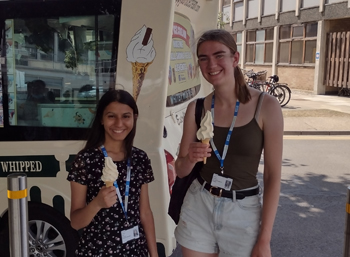
Mathematical snapshots: Emma Beniston
Continuing our series of interviews with maths students and early career mathematicians, we talk to Emma Beniston who is studying at the University of Cambridge. She tells us about what drew her to maths, an exciting summer internship which allowed her to experience life as a maths researcher, and what she is planning for the future.
I have always enjoyed maths, as I love the process of using both logical and creative skills to solve challenging problems. I also love the thrill of solving something which at one point seemed impossible. But it is the enormously wide-ranging applications of maths we see today, from particle physics to Covid modelling, and from statistics to climate sciences, which solidified my decision to study maths at university.

Emma Beniston.
In my summer internship project I worked on a flu virus. I was trying to find regions of the genetic sequences of influenza A virus which remain highly conserved as the virus mutates over time. During a virus's lifecycle, random changes occur to its genetic material, and most of the time, these are harmless, or even beneficial, to the virus. However, some regions of the genetics are of particular functional importance to the virus, and if a mutation occurs in one of these regions, it can cause the virus to die. Consequently, these regions appear highly similar in samples of the virus that we sequence. If we can identify such regions, we can learn more about how the virus functions, and they can also provide good targets for antiviral drugs. I was applying a novel statistical and computational technique to do just this.
Most of the work that I was doing involved data handling and programming. I also had to read lots of papers on influenza A virus so that I knew which regions of conservation had already been discovered, and what the biological explanation for them was. This was challenging at first, since the papers involved a lot of technical microbiology, but I was soon able to pick up the key ideas, and I enjoyed the opportunity to learn about something completely different to the maths I had been doing in my degree.
My experience as an intern was great. My supervisor, Jordan Skittrall, was incredibly helpful and supportive, and I was working alongside his two other summer students. It was really interesting to be able to discuss their projects and exchange ideas with them. Both Cambridge Mathematics Placements and the Department of Pathology provided a lot of support, through organising various workshops on research, report writing and presentation skills.
I was based in one of the labs on the Addenbrooke's hospital site in Cambridge, just metres from people performing experiments with actual viruses, and not far from hospital patients, which made my work and the real-world impact it could have feel all the more important. Also, I was given tours of various labs, attended the Department of Pathology's annual symposium, and went on post-work pub trips with other members of the lab!
Emma's internship was part of the Cambridge Mathematics Placements programme and was funded by the Centre for the Mathematics of Information in Healthcare Hub.
I am currently in Part II (third year) of the undergraduate Mathematical Tripos and am specialising in applied maths and theoretical physics. My courses cover areas such as fluid dynamics, quantum mechanics, general relativity, and mathematical biology.
In the future, I would love to do something research based, particularly applying mathematical techniques to problems in areas which are relevant to wider society. I am currently interested in either further pursuing mathematical biology or doing something in fluid dynamics – I have a project lined up for this summer which is in oceanography!

Emma Beniston with fellow student Vianca Shah during her internship where free ice cream was provided.
A typical day for me as a student will often begin very early with a rowing outing before I make my way over to the maths department for lectures. In the afternoon, I tend to go to the library to work on example sheets, and will sometimes have a supervision. In the evenings, I like to get dinner with friends, especially at formal halls, and if I've got a concert coming up, I'll have an orchestra rehearsal.
During my internship, I would typically spend working hours in the lab in Addenbrooke's. I would begin by working out what I needed to do for the day, and the bulk of the day would then be spent either coding, analysing results or reading research papers. I would get lunch with the other interns in the lab, and on some afternoons I would have a meeting with my supervisor to discuss my progress. The evenings were then free for relaxing or socialising, or, if it was a Friday, a pub trip with members of the lab!
One of my favourite mathematical moments came during my internship over the summer. I was looking through the data I had been analysing when I noticed a region which was marked as conserved but had not been previously identified. When I looked more closely, I saw that there was a plausible biological justification for this region to be conserved too. This was an incredibly exciting moment, as if I was right, I would have discovered something new!
Outside of maths, I am a keen musician, with violin being my main instrument. I am a member of Cambridge University Orchestra, where we get to work with professional conductors and top-class soloists, and I am on the committee of St John's College Music Society, which involves organising musical events around the college. Also, since coming to Cambridge I have taken up rowing and really enjoy the sport – I currently row in my college's first boat.